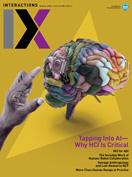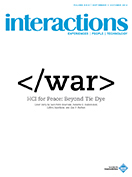Authors:
Meg Grant, Anja Hertenberger, Ricardo O'Nascimento, Leonie Urff, Minhye Lee, Romy Achituv, Mouna Andraos, Melissa Mongiat, Shahar Zaks
Lovely Rita
The TK 730 is a hybrid typewriter/knitting machine that converts words into a knitted code. It does this by decoding the typed word and re-encoding it into the pattern of the knitwork. The idea comes from the common root of the words text and textile: the Latin texere, which means "to weave." A knitted textile work comprises lines and points, just like a piece of text. A story follows a continuous thread. Both text and textiles communicate meaning, but the story knitted by the TK 730 is one you can read, see, touch, and wear. The TK 730 attempts to explore how data can convey different meanings when interpreted as a purely visual form. The project was created with the support of V2_ Institute for the Unstable Media, Rotterdam, The Netherlands.
Project website:
http://www.v2.nl/archive/works/tk-series
Publication: Grant, M., Hertenberger, A., O'Nascimento, R., and Urff, L. TK 730. Proc. of TEI 2012 (Kingston, Ontario, Canada). Feb. 19-22, 2012.
Meg Grant
V2_ E-Textile Workspace | [email protected]
Anja Hertenberger
V2_ E-Textile Workspace | [email protected]
Ricardo O'Nascimento
V2_ E-Textile Workspace | [email protected]
Leonie Urff
V2_ E-Textile Workspace | [email protected]
Lovely Rita is a dress constructed of slits controlled by nickel zippers that double as light controllers. The design of the dress is modified by selectively attenuating the radiance emitted by the incisions. Opening and closing zippers alters the look of the dress both physically and viscerally: Slits are introduced as streaks of light and "heal" as the light is reduced, restricted in length, or shut.
Lovely Rita's radiating "wounds" recall the ecstasy of ascetic practices of self-mortification, and allude to the mysterious power that inflictions, whether physical, mental, or emotional, have on shaping the human spirit.
Project website:
Publication: Lee, M. and Achituv, R. Lovely Rita. Proc. of TEI 2012 (Kingston, Ontario, Canada). Feb. 19-22, 2012.
Minhye Lee
Hongik University | [email protected]
Romy Achituv
Hongik University | [email protected]
The Machine à Turlute is a mobile musical unit that enables the general public to learn a traditional folk-singing style and collectively compose unique musical pieces.
In the late 1920s, Marie Travers, also known as La Bolduc, was the first female singer to sing to the Québec working class. Known as the Queen of Canadian Folksingers, she made a name for herself with her Turlute, a traditional folk singing style, similar to Irish lilting, that sings out instrumental partitions with evocative phonemes.
In 2011, we were commissioned by Lusio Films to develop a Turlute machine as a way to rediscover this musical heritage of La Bolduc and share it with the general public.
Project website:
www.dailytouslesjours.com, www.vimeo.com/34790767
Publication: Andraos, M. and Mongiat, M. Machine à Turlute. Proc. of TEI 2012 (Kingston, Ontario, Canada). Feb. 19-22, 2012.
Mouna Andraos
Daily tous les jours | [email protected]
Melissa Mongiat
Daily tous les jours | [email protected]
Drawing Tool is a conceptual art piece intended to provoke discussion on the subject of authorship and originality through the means of an interactive experience, taking the familiar experience of photography and translating it to the quintessentially creative domain of drawing. The goal is to create a cognitive dissonance that encourages reflection on the experience.
At the same time, Drawing Tool has a practical use as a tool for assisted drawing. In a way similar to how one would use a camera to take a photo of an existing scene, Drawing Tool may be used for creative tracing of a predetermined pattern. While the machine controls the larger-scale composition, users are free to exercise their full creative freedom over the details of the drawing.
Project website:
http://www.shaharzaks.com/projects/drawing-tool/
Publication: Zaks, S. Drawing Tool. Proc. of TEI 2012 (Kingston, Ontario, Canada). Feb. 19-22, 2012.
Shahar Zaks
[email protected]
©2012 ACM 1072-5220/12/0900 $15.00
Permission to make digital or hard copies of all or part of this work for personal or classroom use is granted without fee provided that copies are not made or distributed for profit or commercial advantage and that copies bear this notice and the full citation on the first page. To copy otherwise, to republish, to post on servers or to redistribute to lists, requires prior specific permission and/or a fee.
The Digital Library is published by the Association for Computing Machinery. Copyright © 2012 ACM, Inc.












Post Comment
No Comments Found